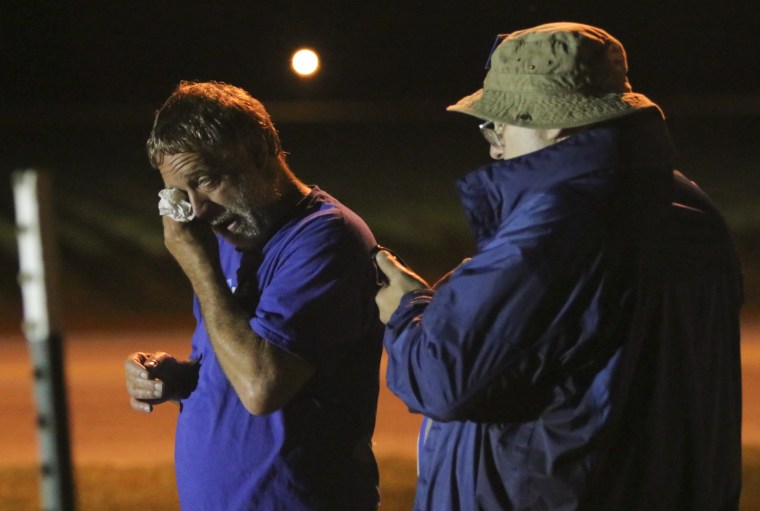LITTLE ROCK — The state of Arkansas once again faces two major legal hurdles in its attempt to execute five death row inmates before a lethal injection drug expires at the end of the month.
The state Supreme Court blocked one inmate's execution scheduled for Thursday, and a Pulaski County Circuit Court judge ruled that Arkansas is not allowed to use one of its lethal injection drugs — the paralytic vecuronium bromide — effectively blocking all of the scheduled executions.
The rulings are just the latest in a number of legal challenges that have so far blocked three men's death sentences from being carried out as part of an unprecedented schedule of eight executions over a 10-day period.
Arkansas Gov. Asa Hutchinson had signed eight death warrants for dates between April 17 and 27, which would have been the most by a state in that period of time since the U.S. Supreme Court's 1976 decision to reinstate the death penalty.
Despite Arkansas' best efforts, Wednesday's court rulings now put the remaining five executions in jeopardy — which is sure to please the many activists that have protested the state's tenacity.

Pharmaceutical company earns restraining order — again
Pharmaceutical company McKesson Medical-Surgical convinced a Pulaski County Circuit Court judge to rule in its favor on Wednesday for the second time in less than a week. The decision blocks Arkansas' ability to use one of its key drugs in the state's lethal injection protocol.
McKesson alleged that the Arkansas Department of Correction deceived it into providing 100 vials of the second drug, vecuronium bromide, for the state's lethal injection protocol. The pharmaceutical company claimed that the state's prison system led it to believe the drug McKesson provided would be used for medicinal reasons.
"Irreparable harm will result," Judge Alice Gray ruled from the bench, according to the Associated Press. "Harm that could not be addressed by [monetary] damages." A written opinion from the Pulaski County Circuit judge is expected Thursday morning.
Related: Arkansas Inmates Ask U.S. Supreme Court to Block Remaining Executions
Pharmaceutical companies have long avoided supplying corrections departments with execution drugs because they do not want their products used to put individuals to death.
This is now the second time McKesson has convinced a Pulaski County judge to place a temporary restraining order on their drug. The first case was dismissed after a district judge placed a blanket injunction on all of the executions — deeming the temporary restraining order and court proceedings unnecessary.
After that ruling was overturned, McKesson filed a new complaint on Tuesday to stop the Arkansas Department of Correction from using the drugs.
"McKesson is committed to ensuring that its property is only used in a manner consistent with our supplier agreement," a company statement said.
Arkansas Attorney General Leslie Rutledge said in a statement through spokesman Judd Deere that she plans to appeal the ruling blocking the lethal injection drug to the state Supreme Court.
Despite the state's uphill battle less than 24 hours before the next scheduled execution, the Arkansas Department of Correction continued to ready its facility for the lethal injection procedures.
“Our preparations are continuing pending the outcome of the appeals,” Arkansas Department of Correction Solomon Graves told NBC News.
The state has also not procured new drugs to replace the vecuronium bromide, Graves said. “Our supply of drugs remains unchanged."
Arkansas Supreme Court ruling blocks inmate's execution
Earlier on Wednesday, the Arkansas Supreme Court granted a stay of execution for death row inmate Stacey Johnson, a day before he was scheduled to die.
Johnson's lawyers argued that new DNA evidence would exonerate him, and if the execution wasn't stopped the state would put an innocent man to death.
“It’s just common sense that before the government sends a man to his death, we should use the best scientific methods to make sure we have convicted the right person," said Innocence Project attorney Karen Thompson, who is working with Little Rock attorney Jeff Rosenzweig on Johnson's case.

The case was sent back to the Sevier County Circuit Court.
The Arkansas Department of Correction, however, continues to prepare a death chamber for Johnson to be put to death Thursday for killing a woman east of the Oklahoma border.
The victim, Carol Jean Heath, was raped and murdered in her DeQueen, Arkansas home, and the defense believes that there remains a large amount of untested DNA evidence that could prove Johnson's innocence.
They point to the rape kit, fingernail scrapings, Caucasian hairs found at the scene, swabs of a bite mark found on the victim's breasts, and clothes stained in Heath's blood found miles from her home.
According to the appeal, "current forensic DNA technology is now capable of identifying the source of that DNA from microscopic amounts of biology left in the course of the crime."
The Arkansas Supreme Court decided in Johnson's favor in a 4-3 split on Wednesday. Two justices wrote dissenting opinions, arguing that questions around DNA evidence had already been put to rest.
Related: Charges Dropped Against Former Death-Row Inmate Rodricus Crawford
"With no explanation or instruction, this matter has been remanded to the trial court for another hearing," wrote Associate Justice Rhonda K. Wood. "Today, our court gives uncertainty to any case ever truly being final in the Arkansas Supreme Court."
If the State Supreme Court's decision isn't appealed and overturned by the U.S. Supreme Court, Johnson's will be the fourth execution blocked since Arkansas Gov. Asa Hutchinson first scheduled an aggressive schedule of eight executions before the end of the month, a move he argued was necessary because a key drug in the state's three-drug lethal injection cocktail expires at the end of the month.
The state attorney general's office has been tenacious, but so far unsuccessful, in its work to overturn the numerous legal challenges to the executions.
The Arkansas Attorney General's office said Rutledge was evaluating her options, which includes appealing to the U.S Supreme Court for the second time in three days.

